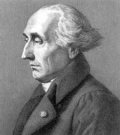Joseph Louis Lagrange

Joseph Louis Lagrange lived from 1736 to 1813 which is considered to be the beginnings of modern math. He was the oldest of 11 children and one of 2 who survived to adulthood. He was born in Italy (Turin, Sardinia-Piedmont ) but is considered to be the Italian born French mathematician. His interest in math started when he was a child and for the most part, he was a self-taught mathematician. By the age of 19, Lagrange was appointed professor of mathematics at the Royal Artillery School in Turin - after Euler stated how impressed he was with Lagrange's work on the tautochrone demonstrating his method of maxima and minima titled 'Calculus of Variation'.
His discoveries were important to the not yet named subject of 'Calculus'. He received 2 offers to work at the prestigious Berlin Academy and finally accepted the offer and succeeded Euler as the Director of Mathematics on November 6th, 1766 but then moved on to the Paris Academy of Science where he remained for the rest of his career.
Famous Quotes:
Before we take to sea we walk on land, before we create we must understand. When we ask advice, we are usually looking for an accomplice.
Contributions and publications:
- while in Prussia, he published the 'Mécanique Analytique' which is considered to be his monumental work in the pure maths.
- his most prominent influence was his contribution to the metric system and his addition of a decimal base, which is in place largely due to his plan. Some refer to Lagrange as the founder of the metric system.
- Lagrange is also known for a great deal of work on planetary motion. He was responsible for developing the groundwork for an alternate method of writing Newton's Equations of Motion. This is referred to as 'Lagrangian Mechanics'. In 1772, he described the Langrangian points, the points in the plane of two objects in orbit around their common center of gravity at which the combined gravitational forces are zero, and where a third particle of negligible mass can remain at rest. This is why Lagrange is referred to as an astronomer/mathematician.
- the Lagrangian polynomial is the far easiest way to find a curve through points.
Source: Wikipedia

